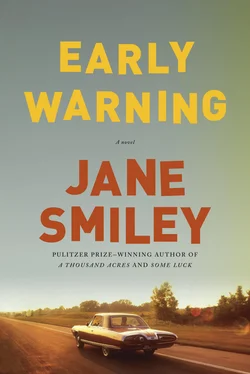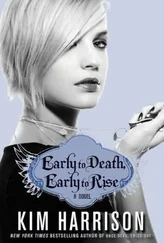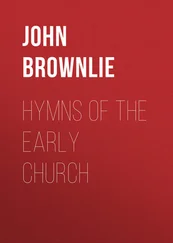Jane Smiley - Early Warning
Здесь есть возможность читать онлайн «Jane Smiley - Early Warning» весь текст электронной книги совершенно бесплатно (целиком полную версию без сокращений). В некоторых случаях можно слушать аудио, скачать через торрент в формате fb2 и присутствует краткое содержание. Год выпуска: 2015, Издательство: Knopf, Жанр: Современная проза, на английском языке. Описание произведения, (предисловие) а так же отзывы посетителей доступны на портале библиотеки ЛибКат.
- Название:Early Warning
- Автор:
- Издательство:Knopf
- Жанр:
- Год:2015
- ISBN:нет данных
- Рейтинг книги:5 / 5. Голосов: 1
-
Избранное:Добавить в избранное
- Отзывы:
-
Ваша оценка:
- 100
- 1
- 2
- 3
- 4
- 5
Early Warning: краткое содержание, описание и аннотация
Предлагаем к чтению аннотацию, описание, краткое содержание или предисловие (зависит от того, что написал сам автор книги «Early Warning»). Если вы не нашли необходимую информацию о книге — напишите в комментариях, мы постараемся отыскать её.
, a national best seller published to rave reviews from coast to coast.
Early Warning — читать онлайн бесплатно полную книгу (весь текст) целиком
Ниже представлен текст книги, разбитый по страницам. Система сохранения места последней прочитанной страницы, позволяет с удобством читать онлайн бесплатно книгу «Early Warning», без необходимости каждый раз заново искать на чём Вы остановились. Поставьте закладку, и сможете в любой момент перейти на страницу, на которой закончили чтение.
Интервал:
Закладка:
“Mary Elizabeth.”
“Mary Elizabeth was struck by lightning.”
“Oh goodness!” said Rosanna, setting down her fork with a ding on the plate. “Does she think that? Heavens, no. Lightning did strike. But she fell. Maybe the thunder startled her. It was bang-bang, like that, the lightning so close. The back of her head hit the corner of an egg crate. She died without a mark on her.” Rosanna shook her head. “I’m amazed to this day I can say any of that aloud. What is today?”
“May 1.”
“You know, she was born forty-one years ago. January 28. And she was no trouble, just like this one.”
But Claire didn’t want there to be any resemblance between that ill-fated child and this one, destined for greatness. Rosanna offered Gray the spoon again, and this time he curled his fist around it. Rosanna said, “I think that’s advanced.”
“Of course it is!” Claire laughed.
It was the ice cream that was good — it had been made by Lois, who was going through an ice-cream phase. It was peppermint, sweet and sharp. They ate it while Claire nursed Gray, and then Rosanna quietly washed the dishes (including the aluminum pie holders, for some reason). Then she went into the living room and turned her show on low. Sitting in the kitchen, gently rocking back and forth in her chair, feeling Gray draw the milk out of her and the ache subsiding, Claire thought that maybe, maybe she would forgive Rosanna, but she couldn’t remember what for.
—
LILLIAN TOOK the Mustang. Tim didn’t know she was coming, but she knew where he lived, and she could wait for him if she had to. She left a note for Arthur in the middle of his desk, where he might see it if he was not too distracted, and as she drove away — got farther and farther from the note — she began to feel freer and less anxious. She would have expected it to be different — closer to Tim, more worried. But there it was — farther from Arthur, less worried.
The road was one of the most beautiful Lillian knew of, much more romantic and rolling than any road in Iowa. As Arthur invariably pointed out when they went for a drive, the Land Ordinance of 1785 was way too late for Virginia, and so it was not laid out in a grid, but according to chance and convenience. This meant that Lillian drove through this town and that town, around this curve and over that hill, in the shadow of mountains, past farms and fences and thick stands of trees. Horses and cows grazed in green pastures and there weren’t many houses. Once she was past Culpeper, the few she saw looked like ones she knew back home — the plantations seemed to have been hidden away. Lillian liked the sweep of it, and the names of towns like Haymarket and Ruckersville.
When Bundy got back from Vietnam (and Arthur had almost gone with him, only kept home at the last minute by a bout of the flu), Bundy was a different man. The sight of the bodies at Pleiku had literally changed his appearance — whereas before he had been sharp but a tad removed, as if always calculating, when he got back he was sure of one thing — the Viet Cong had to be repaid. Sure, he phrased this in terms of strategy — yes, it could be done, a harder push, more bombs, take off the brakes and apply the gas, if they feel our resolve they will back off — but really his blood had boiled, his wrath had burned. At first, Arthur laughed and said, “Well, if they’d let me belt him in a nice straitjacket for a few days, just take him to a suite at the Hay-Adams and give him a shower ten times a day, I might have saved him.” But then Bundy had convinced Arthur, and the spring had been calm with conviction — the bombing was unfortunate, but necessary; it would soon be over; sometimes a wound had to be cauterized. The calm had been pleasant. Arthur had been more his old, pre-JFK self, bringing home flowers and lingerie, eating, going to Dean’s baseball games, not only admiring Tina’s paintings but discussing them with her. JFK had driven everyone crazy — he said this, then he said that, and never the twain should meet, but that was over, had been over for a year and a half. Thinking of JFK made her think of Mary Meyer, gunned down by the canal. (Had she really been his mistress? These days, the rumor mill was strangely silent.) Lillian shook that thought out of her mind and made herself pay attention to the scenery.
She drove through Gordonsville, and soon after that turned off 29 and onto Ivy Road, gazing over the fields to her right in hopes that she would see Tim. Two F’s! The lowest grade he had ever gotten before (though there had been several of them) was a C. She did a careful U-turn and headed toward the center of town, to find a Coke and maybe a sandwich.
Straight A’s were such a habit with Debbie that Arthur considered them almost a character flaw. When she brought home her report cards, Arthur would lower his brows and growl, “How much extra credit did you do, missy?” Debbie’s job was to grin and say, “Hardly any, Daddy!” He didn’t mind 800s on her SAT Aptitude tests, but 800s on the Achievements were a sign of a misspent youth. Tim had scored in the low 600s on his SATs, and when those scores came in the same week he crumpled the bumper of the Comet, Arthur was a little relieved. A boy had to be a boy had to be a boy.
But he didn’t have to flunk out of college. Lillian parked in a space in front of a drugstore and went in. The soda fountain was all the way in the back, and the girl working there was blond. Lillian perched on a stool and put her elbows on the counter, vowing not to tell the girl that she had worked a soda counter once herself. The few college students perched on the other stools did not remind her of the ones she’d seen protesting the war at the Capitol in April. Eloise had called her from California and said she had to go to the protest — with a hat and dark glasses so no one would recognize her, so that her picture would not cross Arthur’s desk. So she did. Eloise had participated in the Oakland protest in February, bringing along Rosa, the baby, and even the strange gambler husband, who was otherwise “apolitical” according to Rosa. Lillian didn’t believe there were twenty-five thousand protesters, as Eloise insisted from her vantage point in Berkeley — maybe half that number. But the D.C. protest had been exhilarating. If Arthur, Debbie, Dean, or Tina suspected she had gone, none of them had said a word.
The sandwich was good. She ate it slowly, because once she was done, had eaten every crumb, had drunk her soda, had wiped her mouth and gone into the ladies’ room to comb her hair, she would have to find Tim and figure that boy out.
She had been to his room twice before, and knew the number—215. She knocked on the door, at first lightly, and then more sharply. There was a groan, a pause, then Tim’s voice, irritable, “Who is it?”
Lillian said, “It’s me.” She looked at her watch. It was a quarter after one.
“What!”
A little louder. “It’s me. It’s your mother.”
Then, “Oh jeez!” Footsteps. Then the door opened. Tim was leaning on it. He was dressed in a white undershirt and dirty jeans. He stared at her and said, “Oh God.” He left the door open and went over and fell on the bed. Lillian followed him.
She said, “Are you hung over?”
“Oh God.”
The evidence was under the bed — empty beer bottles.
“You didn’t tell me you were coming.” He groaned again.
“It was a last-minute thing, and I thought you’d be at work, so how would I reach you?” She looked around, glad to see at least some evidence of a party in the general mess — records lying around, a girl’s shoe, two glasses and two plates, a sweater she didn’t recognize that maybe someone left behind. She said, “Did you have a party?”
Читать дальшеИнтервал:
Закладка:
Похожие книги на «Early Warning»
Представляем Вашему вниманию похожие книги на «Early Warning» списком для выбора. Мы отобрали схожую по названию и смыслу литературу в надежде предоставить читателям больше вариантов отыскать новые, интересные, ещё непрочитанные произведения.
Обсуждение, отзывы о книге «Early Warning» и просто собственные мнения читателей. Оставьте ваши комментарии, напишите, что Вы думаете о произведении, его смысле или главных героях. Укажите что конкретно понравилось, а что нет, и почему Вы так считаете.











